Anti-racism Information and Resources
An anti-racism information campaign by DIVERSEcity
As a champion of diversity and inclusion, and an organization working toward fully refining our values as an anti-racist organization, DIVERSEcity Community Resources Society encourages everyone to educate themselves about racism and other people’s lived experiences and perspectives. However, not everyone is at the same stage of understanding. To help spread information and awareness, we have launched an anti-racism information social media campaign. There is so much work to be done, but every small step in combating hatred or misinformation can help make a positive difference. Learning to be anti-racist is an evolving journey. For us at DIVERSEcity, it’s about continuous learning and growth.
Please follow us on Facebook, Twitter, Instagram and LinkedIn (@diversecitybc) to read DIVERSEcity posts and posts that we share, or check back here to see an archive of our content, with links to additional resources. Please note that each post we’ve created is based on the best information and research available to us at the time.
What’s a microagression?
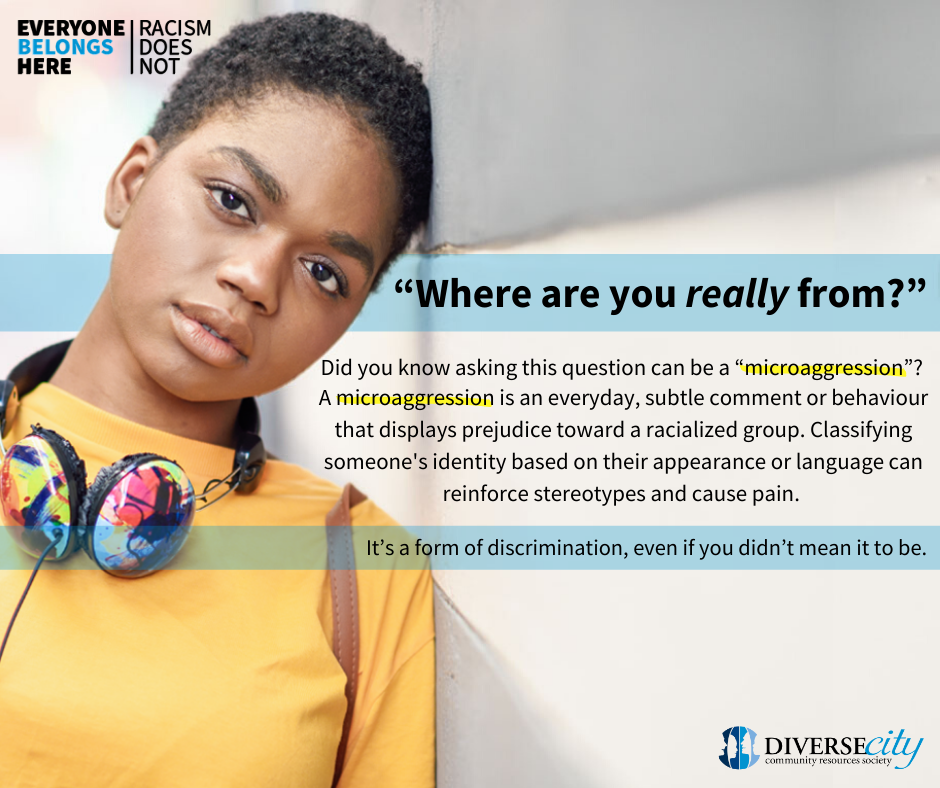
A microaggression is an everyday, subtle comment or behaviour that displays prejudice toward a racialized group. Classifying someone’s identity based on their appearance or language can reinforce stereotypes and cause pain. It’s a form of discrimination, even if you didn’t mean it to be. More recently, it’s best to just call it what it is – an act of racism.
Additional resources:
- Business Insider article on common microaggressions in the workplace
- Definition of microaggressions from Psychology Today
Understanding Indigenous word origins
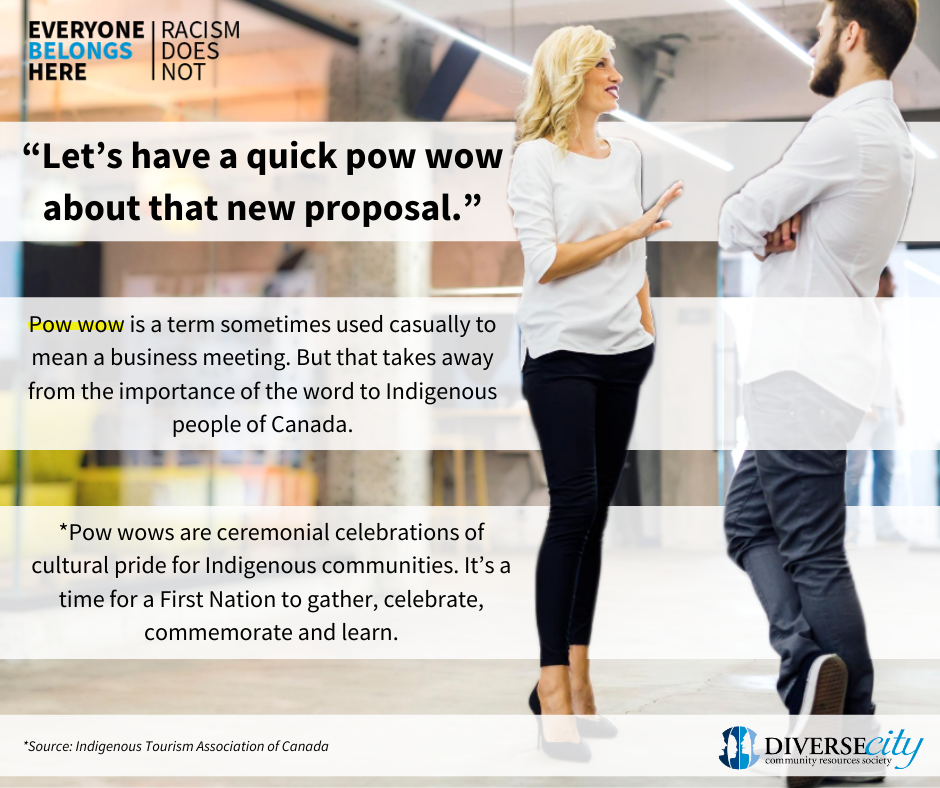
Do you use words like “pow wow” or “chief” in business or personal settings? Using words that are meaningful to Indigenous culture in this casual way takes away from the importance of the words. For example, a pow wow is a a ceremonial celebration of cultural pride for First Nations.
Additional resources:
I’m just kidding!
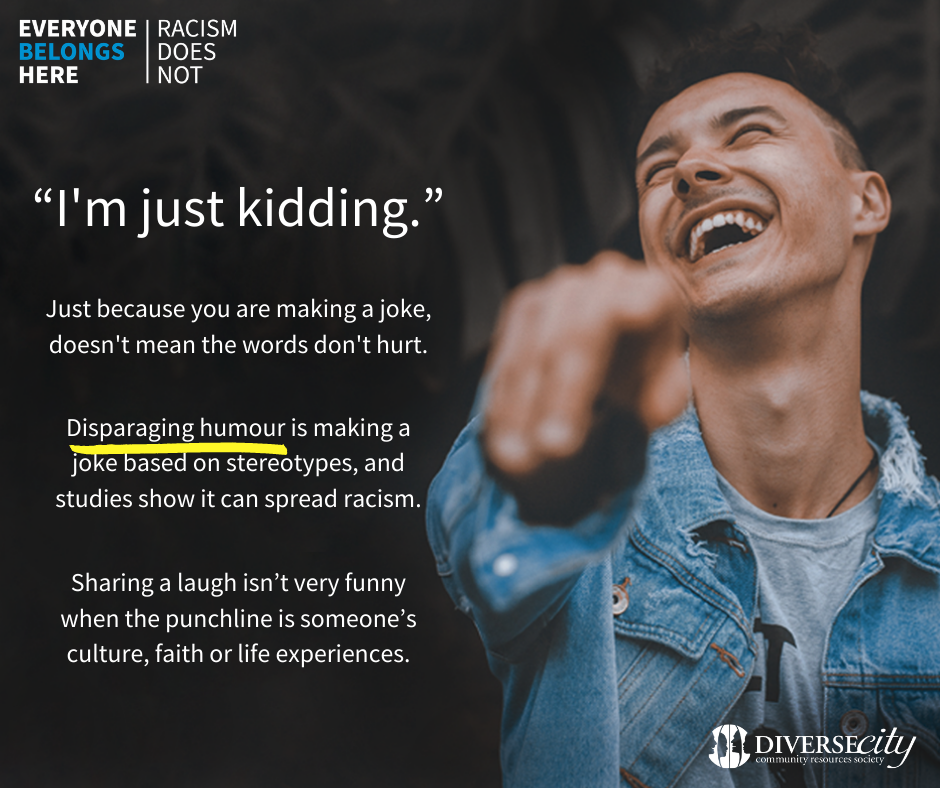
Making a joke at the expense of someone else’s faith, culture or life experience isn’t funny. It can spread racist ideas, even if that wasn’t your intention. Just because you think you’re “just kidding,” doesn’t mean the words don’t hurt.
Additional resources:
- Jacob Jarrett’s TEDx Talk discusses how racist sentiment is perpetuated through “jokes,” and their impact.
- Beyond a Joke: The Limits of Humour
What is colourism?
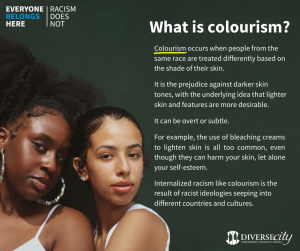
Colourism is a sub-category within racism. It occurs when someone with a lighter skin tone is treated better or preferred over someone of the same race with darker features. It is most common within a race, rather than between two different races.
Additional resources:
- A Vox explanatory article in addition to the author’s lived experience
- Colourism and its impact in the workplace
Embrace your accent
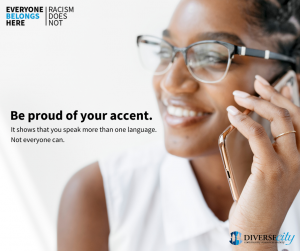
Sometimes the fear of being different can stop us from making new connections or sharing our ideas. We have to move past this fear and remember that our life experiences make us who we are. It is a strength to speak multiple languages, not a weakness.
Additional resources:
How to be a good ally
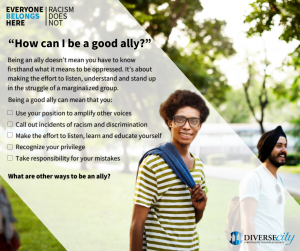
What’s an “ally”? There are many ways to be an ally in the anti-racism and other movements, even if you have never felt oppressed firsthand. In brief terms, being an ally is about making the effort to listen, learn and stand up for marginalized groups.
Additional Resources:
- An open source starter guide to help you become a more thoughtful and effective ally
- 4 ways to be an ally in the fight against racism
- How to become an ally: Educators, community leaders explain ways to stand up to anti-Black racism: an interview with Handel Kashope Wright with the University of British Columbia’s Centre for Culture, Identity and Education
Why being “colourblind” to race is unhelpful
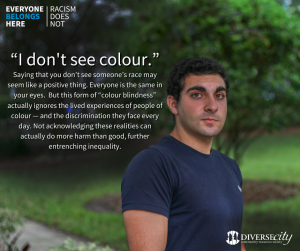
Seeing someone’s colour or race doesn’t mean you are racist. It means that you acknowledge their lived experiences, identity and the discrimination they face. When working toward true equality, we must embrace one another’s differences — not omit them.
Additional Resources:
- WATCH: Why ‘colorblindness’ is not the right approach to race
- Why “I don’t see race or skin colour” is an unhelpful anti-racism strategy
Evolving language
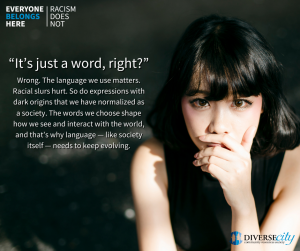
Did you know that terms like “gyp,” “long time no see” and “peanut gallery” have racist origins? Ever wonder why a word commonly said a generation or two ago is no longer acceptable today? Language needs to evolve as society evolves because the words we use reflect and reinforce our beliefs and attitudes. So, no, using a word or racial slur from the past that’s now considered offensive is not “just a word.” Using it makes a statement of who you are and what you believe.
Additional Resources:
- The Weaponization of English
- The Power of Words to Confront Ageism
- 12 Common Words And Phrases With Racist Origins Or Connotations
- 12 racist and offensive phrases that people still use all the time
- Commonly used terms that actually have racist origins
Canadian experience
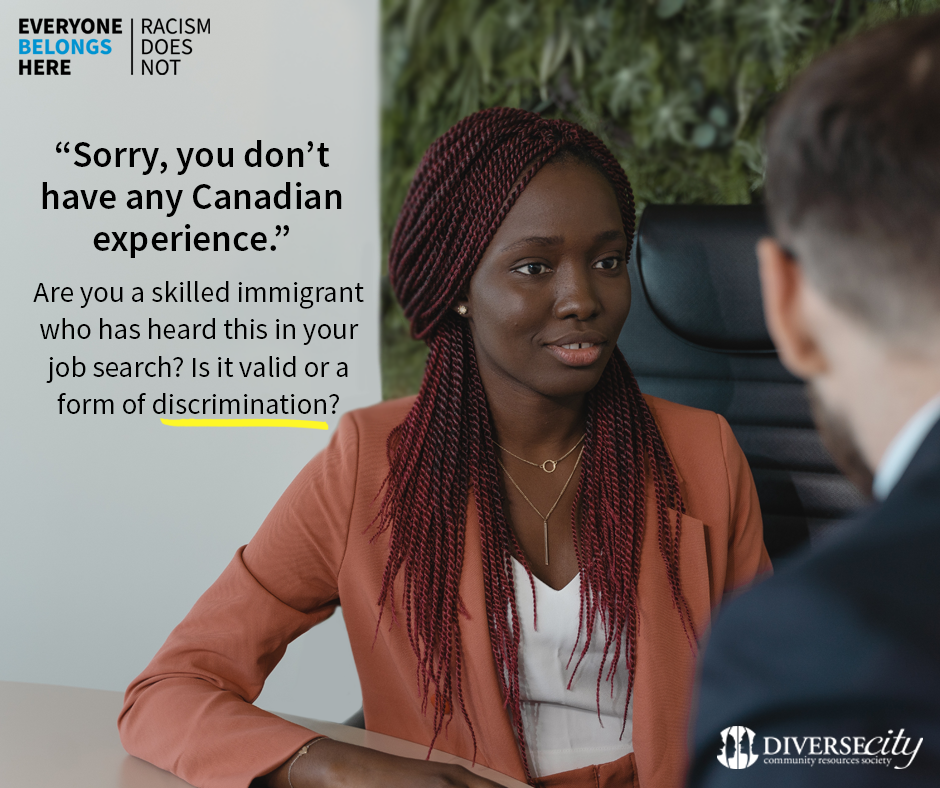
Are you a skilled immigrant who has heard “Sorry, you don’t have Canadian experience” as a reason for not getting the job? Do you think it’s fair? Is it a form of systemic racism?
According to the Ontario Human Rights Code, “In some cases, requiring applicants to have Canadian experience may be disguised discrimination, and a way to screen out newcomers from the hiring process.”
Employers in Canada may not want to risk hiring someone who doesn’t have an understanding of Canadian business practices. But this blanket excuse for screening out newcomers can also be just that — an excuse. This can lead to employers missing out on the innovation that newcomers can bring.
For the newcomer, it’s a barrier they can tackle through strategies like volunteering, networking and training. But isn’t it also time for employers to see this excuse for what it is?
Additional Resources:
- The myth of “no Canadian experience”
- Demanding Canadian experience is no way to conduct business: Comment
- Racism in Hiring: Why “No Canadian Experience” is Unacceptable [Opinion]
- Why Do Skilled Immigrants Struggle in the Labor Market? A Field Experiment with Thirteen Thousand Resumes
Anti-Racist
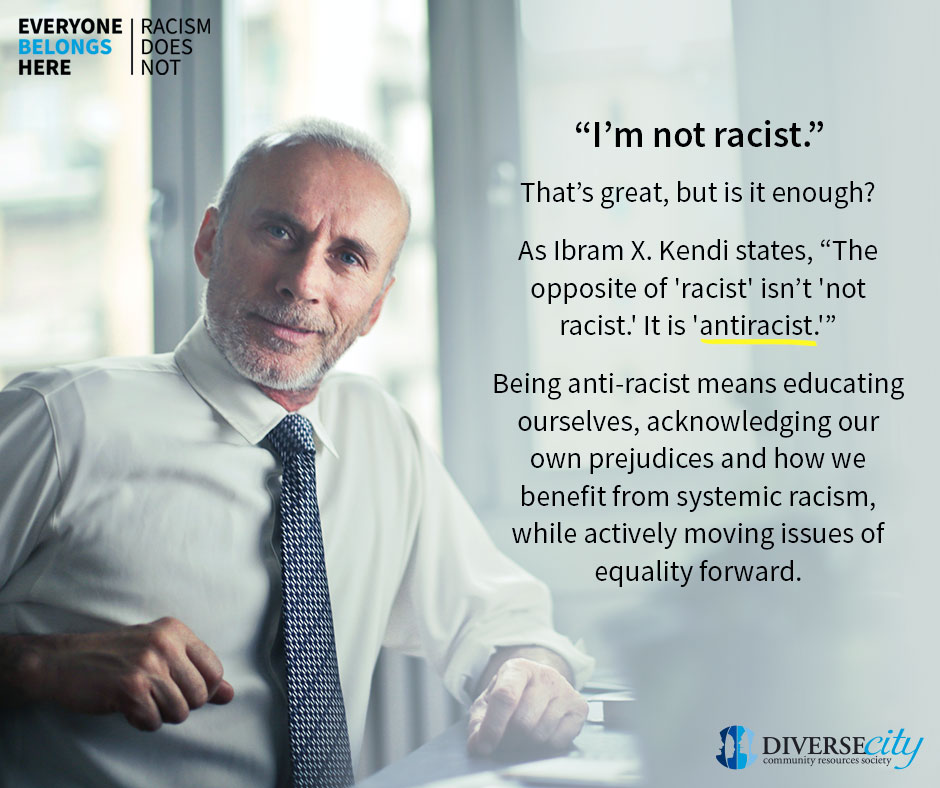
When someone says they are “not racist,” they may be in denial about their own prejudices and the way they benefit from racism. In order to fight racism and move issues of equality forward, we have to admit that we have racist ideas and behaviours, be vulnerable and actively become anti-racist in everything we do and say.
Here is a summary of some of the tips to help you get started on your anti-racism journey:
- Learn to identify and recognize your own privilege and the role it plays in your everyday life.
- Have discussions with your family and friends about race and how it affects their lives.
- Listen and believe people of colour when they talk about their experience with racism.
- Educate yourself on anti-racism and systemic racism by reading books and articles, watching movies and TV shows, signing up for an anti-racism training or workshops.
- Speak up in your workplace and help develop anti-racist work policies.
- Support local and national organizations fighting racism.
- Vote to dismantle systemic racism in your government and institutions.
- Be prepared to make mistakes, apologies when you do and learn from your mistakes.
Check out the articles and resources below to learn more about this topic
- The difference between being “not racist” and antiracist | Ibram X. Kendi
- ‘Not Racist’ Is Not Enough: Putting In The Work To Be Anti-Racist
- Book Club Kit and Reading List on How to be Antiracist
Additional sources:
- Instagram post by @ebbandflood – Brian Herrick Comic Episode 1: Reading About Anti-Racism
- Instagram post by @soyouwanttotalkabout – So You Want to Talk about Anti-Racism
Be an ally, not a bystander
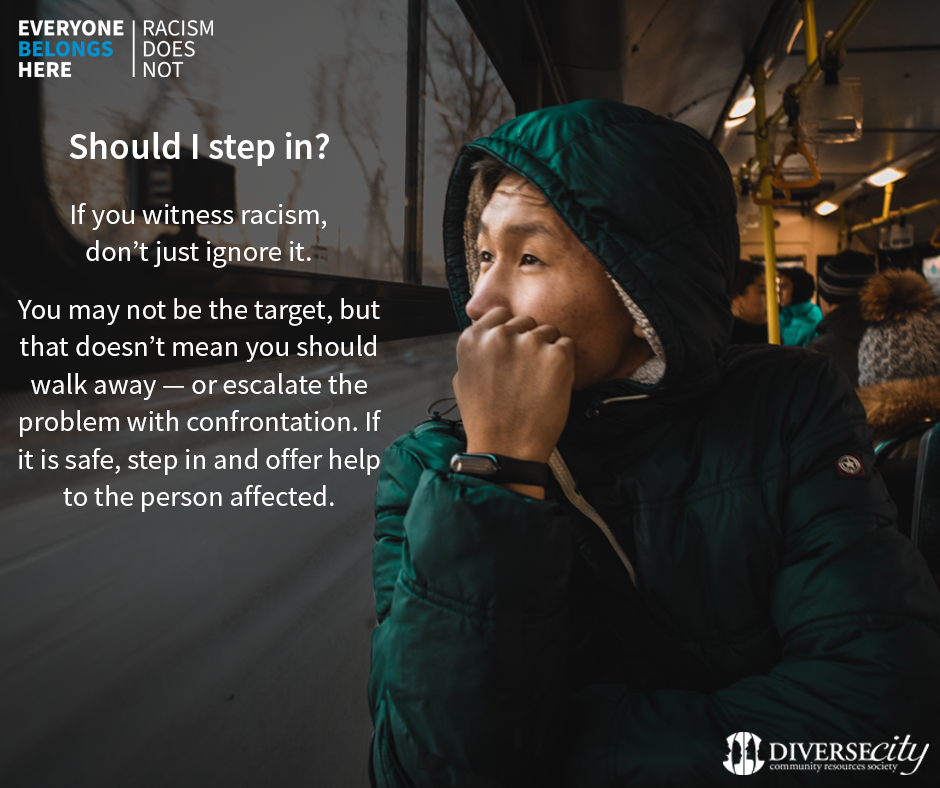
It is normal to want to avoid stressful, awkward or even aggressive situations. That being said, sometimes doing the right thing is hard.
If you have the power and privilege to help someone else, you should do so. If everyone looks away, there is no one left to help. You do not have to confront the aggressor. Go sit by the person in need. Share some kind words. Let them know they are not alone. If it isn’t safe to step in, record it. You can also report it to the police. Make sure the whole incident does not get ignored. To learn more about refusing to be a bystander, please see the resources below.
Additional Resources
- Be an ally, not a bystander
- Witnessing racism: what to do as a bystander
- How to intervene if someone is being harassed
Have you experienced a hate crime?
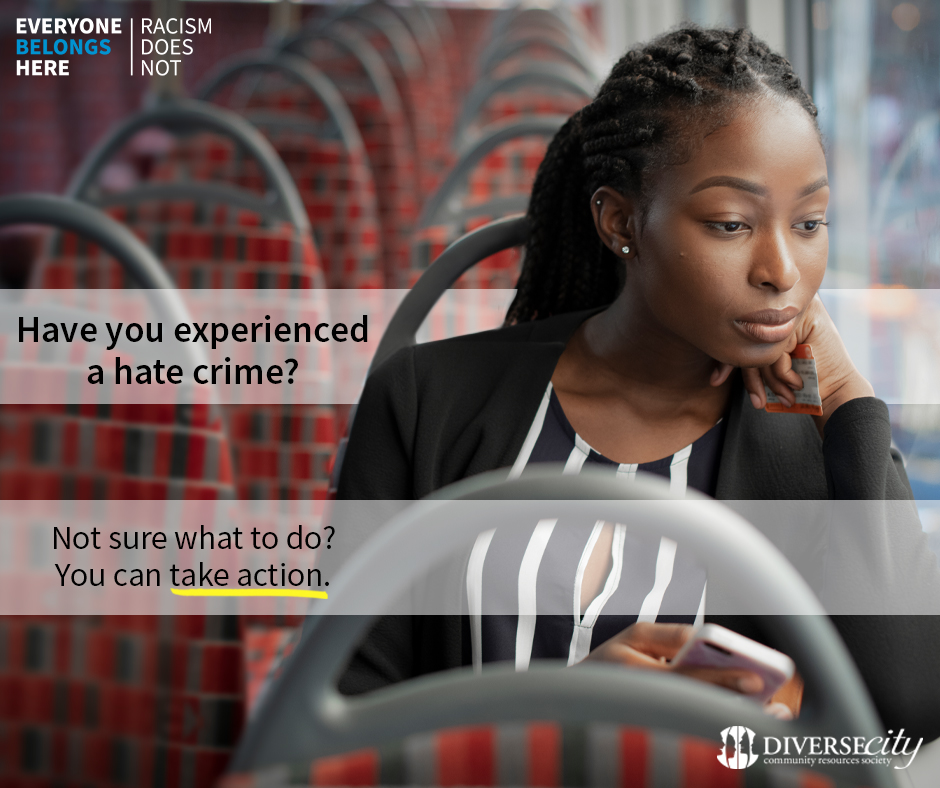
Every British Columbian has the right to feel safe. We all have a right to participate and belong in our community.
To learn more about what hate crimes are and what you can do if you are victim to a hate crime, information is available in several languages, including the following videos in English, Mandarin, Cantonese, Korean, Tagalog, Vietnamese, and Japanese here.
If you wish to contact victim services, call VictimLink BC at 1-800-563-0808, a toll-free, BC-wide telephone help line, available 24 hours a day, 7 days a week providing information and referral services to all victims of crime, and immediate crisis support to victims of family and sexual violence.
Additional Resources:
- Learn what constitutes and emergency or non-emergency
- Find your local police department or RCMP detachment
An increase in anti-Asian hate crimes
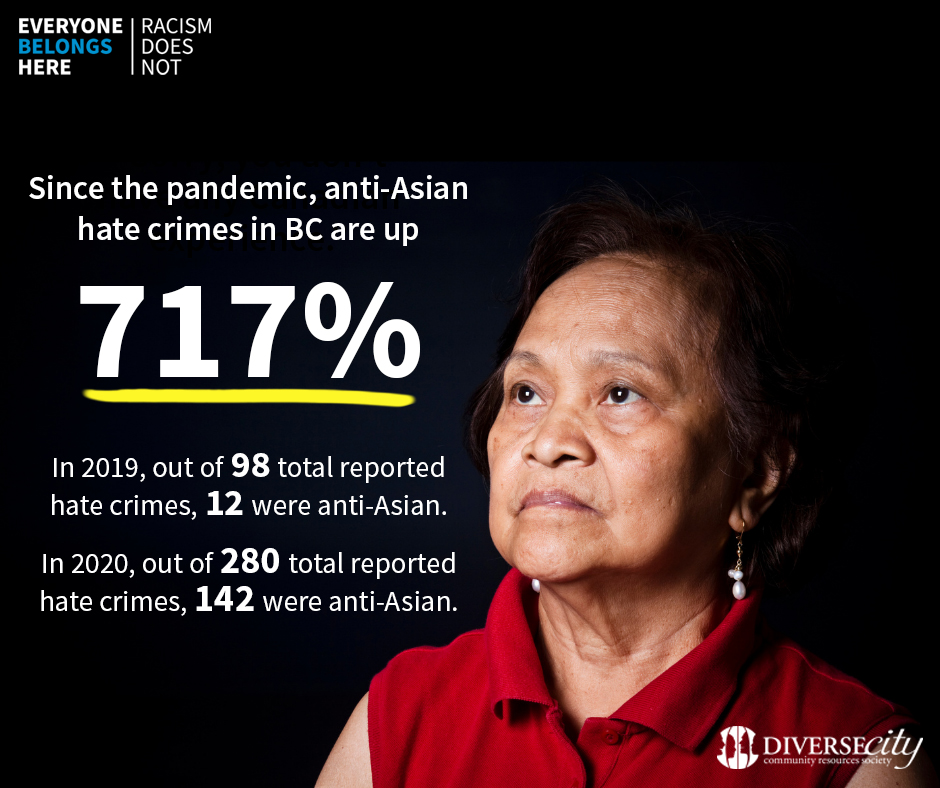
The increasing rate of hate crimes, especially against the Asian community, is unacceptable. We as a society have to work together to ensure that every British Columbia receives compassion and respect.
For tips and resources on how to stand against hate crimes, visit the links below.
Additional Resources:
- Anti-Asian Racism and Hate Incidents Resource List
- Resources for Addressing Anti-Asian Racism in the Time of Coronavirus
- Report Hate Crime in BC
Racialized Wage Gap
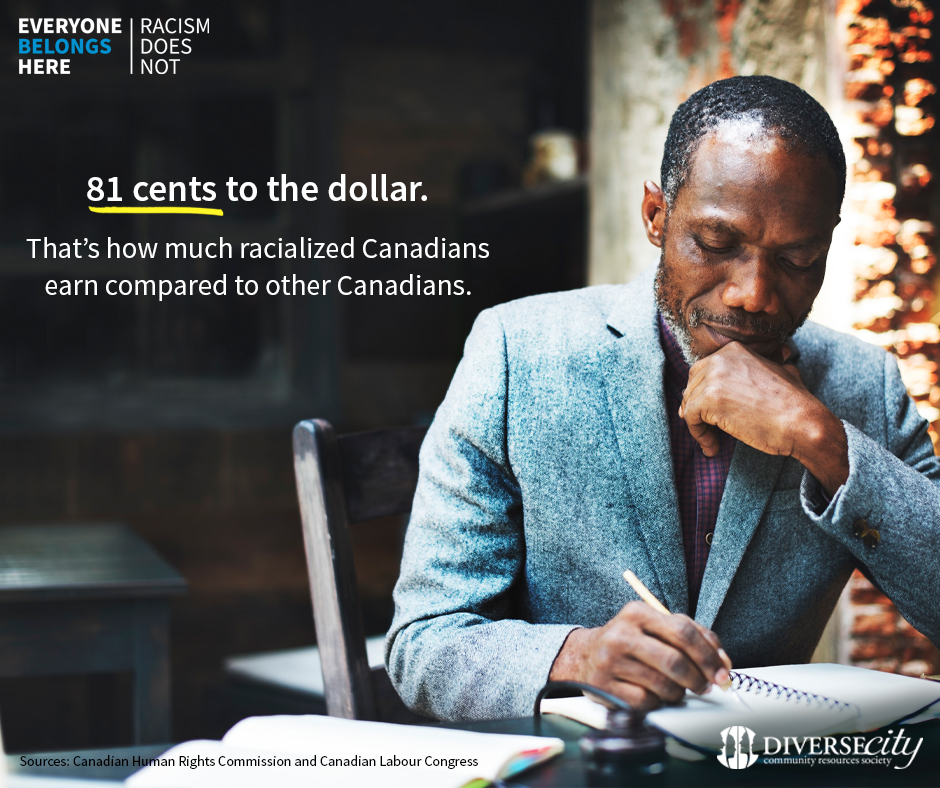
Did you know there is a wage gap for racialized Canadians? According to the Canadian Human Rights Commission and Canadian Labour Congress, racialized Canadians earn 81 cents to the dollar compared to other Canadians.
But, when looking at different studies, that number fluctuates. For example, racialized women earn less for every dollar earned by white men than racialized men. And racialized first-generation immigrants earn less than second-generation.
For more information on these stats and the systemic reasons for this inequity, visit the links below.
Additional Resources:
- Racial, Ethnic and Religious Rights
- Canadian Labour Congress
- The Facts about the Gender Pay Gap in Canada
- Racial Wage Gap Statistics
- Canada’s Racial Gap On Income: a study
- Income gap persists for recent immigrants, visible minorities and Indigenous Canadians
A Continuous Journey
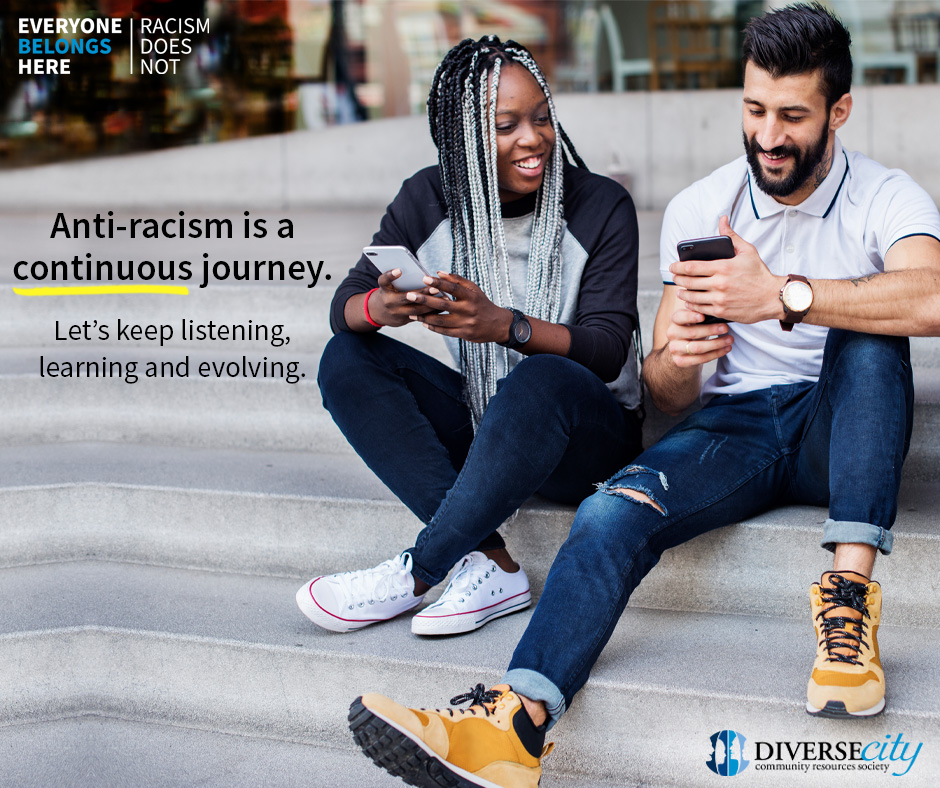
It’s been almost a year since the death of George Floyd and an anti-racism movement that has touched all corners of the globe. It has inspired challenging conversations, some uncomfortable self-reflection and hopefully progress toward equality for all.
At the same time, we’ve unfortunately seen hate crimes increase during this pandemic, particularly against the Asian community.
There is still so much to be done. History to learn. Biases to unlearn. Voices to hear. Experiences to share.
As a registered charity that supports diverse and vulnerable communities in Canada, we at DIVERSEcity keep learning and evolving as we work toward fully refining our values as an anti-racist organization.
As the work to end racism in Canada and the world continues, let’s keep listening, learning and evolving.
Additional Resources:
- Anti-racism FAQs by the Government of BC
- Faces of Racism online resource by Options Community Services
- 7 Strategies to Help You on Your Anti-Racism Journey
- Antiracist Parenting is a Journey Not a Destination
If you would like us to share anti-racism resources here, please email marketing@dcrs.ca.

